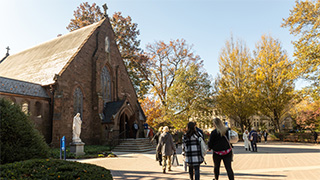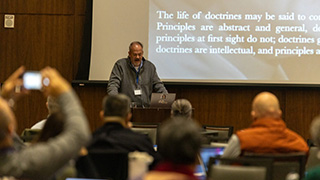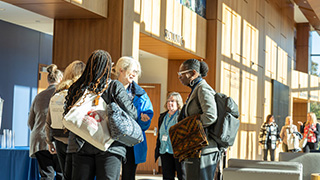Science and Faith Event Presented by the Center for Catholic Studies
Tuesday, November 14, 2023

Participants attended Mass at the Chapel of the Immaculate Conception.
On Friday, November 3, the Center for Catholic Studies partnered with Notre Dame’s McGrath Institute for Church Life to hold its second annual Faculty Development Day for Catholic School Teachers. Over 50 teachers, administrators, and educators representing 20 Catholic schools across four dioceses gathered in Bethany Hall for a full day of talks, discussion, and dialogue on this year’s program theme, "Science and Faith: Exploring the Relationship."
The Catholic Intellectual Tradition has always taught the true complementarity between faith and reason, scripture and nature. Both science and faith point to and reveal, through their respective genres of expression and modes of knowledge, truths about the world and its Creator. However, in modern society these two disciplines are often assumed to be in conflict, making engagement with this topic, marked by misunderstandings and confusion, a particular challenge for teachers in a classroom setting. Acknowledging this difficulty, the development day aimed to equip educators to communicate more confidently and effectively about the hand-in-hand relationship between faith and reason, and to be able to clarify students’ misconceptions about the Church’s real appreciation of scientific pursuit.
Participants had the opportunity to learn from renowned Catholic scholars and experts in the fields of both theology and science, tackling topics within the contemporary faith and science discourse that today’s high school students often ask about. Maureen Condic, Ph.D, Associate Professor of Neurobiology, Adjunct Associate Professor of Pediatrics, and Ombudsman at the University of Utah, delivered the opening keynote, "What is human life and when does it begin?". The closing keynote, "Science and Faith: Past, Present, and Future", was presented by Seton Hall Assistant Professor of Systematic Theology Rev. Joseph Laracy, S.T.D.. It addressed the roots of the faith-science conflict hypothesis and the arguments, both realist and metaphysical, that dispel it.

Christopher Baglow presented "Extraterrestrial Life and Catholic Theology".
For the rest of the morning and afternoon sessions, teachers were able to attend the presentation of their choosing out of three concurrent talks. Three of the six total breakout presentations featured leaders of the McGrath Institute’s Science and Religion Initiative: Chris Baglow, P.h.D., the initiative’s director and a Professor in the Department of Theology at the University of Notre Dame, spoke on "Extraterrestrial Life and Catholic Theology"; program director Heather Foucault-Camm answered "Why You Don’t Need to Fear Your Toaster: What is Artificial Intelligence and What Does it Do?"; and Stephen M. Barr, Ph.D., current visiting scholar at the McGrath Institute and Professor Emeritus in the Department of Physics and Astronomy at the University of Delaware, explored "Is the Universe made for Life?".
The Science and Religion Initiative is an operation of Notre Dame’s Mcgrath Institute for Church life, which partners with Catholic dioceses, parishes, and schools and connects the Catholic Intellectual Tradition to both the university and the life of the Church. One of the Mcgrath Institute’s many creative programs for evangelization and formation, the Science and Religion Initiative responds to the need for integration of fruitful dialogue in education on the topic of faith and reason. Speaking on the collaboration between the Mcgrath Institute and the Center for Catholic Studies, Matthew Higgins, Ed.D., the Center’s Director of Programs said, "It’s been such a blessing to work with our friends in the McGrath Institute. They offer their expertise and resources while allowing us at Seton Hall to truly make this event our own. This collaboration affords us in the Center for Catholic Studies the ability to fulfill the mission of Seton Hall as an Archdiocesan University, by being both a resource and service to our local Church. Offering this program for our Catholic School teachers is a phenomenal way to live that mission."
Rounding out the breakout session lineup, Katherine Bulinski, Ph.D., Associate Professor of Environmental Studies at Bellarmine University, spoke on "Human Beings through the Lens of Deep Time", and Jose Lopez, Ph.D., a Professor of Physics at Seton Hall and internationally recognized expert in the subfield of microplasmas, presented "Our Enigmatic God and the Omnipresent Electron". Finally, Seton Hall minister to the priest community and professor Rev. Gerald Buonopane, Ph.D., discussed "The Science and Theology of Food", offering key points and highlights from the CORE III course of the same name, which he teaches as a senior lecturer in Chemistry and Biochemistry.
Throughout the program, intervals between presentations and breakout sessions allowed participants to share in fellowship with their fellow teachers and with the presenters, as well as to reflect and pray together (including noon Mass at the Seton Hall Immaculate Conception Chapel). Attendees were encouraged to thoughtfully consider the material presented, to ask questions and share their own experiences dealing with science and faith in education. The day ended with a spontaneous roundtable, as teachers shared best practices and built on one another’s suggestions for how to implement discussion practically and pastorally among their students and wider communities.
Mary McManus-Mcelroy, Director of the New Jersey Network of Catholic School Families and Government Funded Programs at the Archdiocese of Newark, shared her thoughts on the event:
"Thank you to the Center for Catholic Studies, Seton Hall University, and the McGrath Institute for Church Life, University of Notre Dame, for hosting "Science and Faith: Exploring the Relationship", at Seton Hall University. Increasingly, students wonder if scientific concepts are at odds with the Church, and this seminar provided detailed examples of how scientific inquiry has been supported by the Church, with many great scientific advancements made by members of the clergy. For Catholic school educators to explore how Catholic Intellectual Tradition is in dialogue with the sciences is not only practical and timely but affirms their unique role in breaking open God’s wisdom at work in the world around us. The format of the day made it easy for teachers to engage with the Seton Hall University professors and program staff of the McGrath Institute who are experts in their respective fields."
The Center for Catholic Studies looks forward to continuing to facilitate discussion and understanding of this crucial topic in light of the Catholic Intellectual Tradition. In the words of Rev. Laracy, "A 2015 Pew Research Center study showed that 59% of Americans surveyed believed that science and religion are often at odds. It is essential that we empower secondary school teachers to engage the conflict hypothesis of science and religion. Seton Hall University is uniquely positioned to be a leader in this space." It is the hope of the Center that in contemplating those questions that lead to encounter with the divine mystery, educators may be strengthened to guide students in their own search for truth.
Categories: Faith and Service


